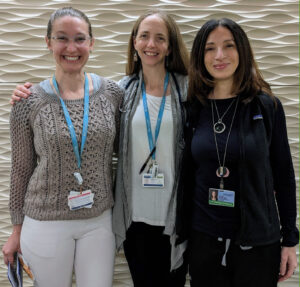Children’s Hospital of Philadelphia receives funding for pediatric HHT patients

HHT providers at the Children’s Hospital of Philadelphia receive funding from the Department of Pediatrics Chair’s Initiative to increase clinical and research excellence for pediatric HHT patients.
I had the opportunity to visit our pediatric team at the Children’s Hospital of Philadelphia (CHOP) while in town for a conference. The team was awarded an internal grant of $200,000, and we wanted to highlight the work they propose to do with this project.
Dr. Lauren Beslow (Neurology) kindly volunteered to give me a tour of CHOP. This children’s hospital is one of the most beautiful I’ve seen and is completely designed with kids in mind. Carefully chosen artwork that is cheerfully representative of children with all kinds of abilities, lit-up sculptures of brains, sensory mats on the floor, tabletops with pieces that spin, bookshelves with free books to take home, and colors everywhere truly make CHOP seem like a giant play area where you happen to see a healthcare provider. As a parent to children with HHT, it makes me truly thankful for the efforts made to make children feel as at-ease as possible during potentially difficult times.
Of course, having a cheerful environment helps, but what the providers are doing within that environment is the critical piece. The CHOP HHT team is using their award to improve care for HHT patients by focusing on 4 different areas. Dr. Alex Borst (Hematology) described this 4-prong approach as focusing on 1) their clinical program, 2) addressing health disparities, 3) research, and 4) providing education to other clinicians in the hospital system.
 Dr. Borst: “In the clinical program, we are really trying to build up our multidisciplinary team and have a coordinator to help with scheduling visits and imaging for patients and their families as well as to work on a clinical database for our patients. As part of this effort, we are also hoping to address the health disparities that we know exist in HHT and other rare diseases by working on building a telehealth program as well as tracking some of the racial, social, and economic disparities that affect care for our patient population. From the research side, we are engaged in several different projects. We will obtain additional genomic data, both from resected AVM tissue we have access to through a neurosurgical biobank with Dr. Shih-Shan Chen [Neurosurgery], as well as sequencing for patients that don’t have a known genetic variant. From the education side, we are working on QI [Quality Improvement] projects to ensure we identify all the children who need to be tested and screened for HHT.”
Dr. Borst: “In the clinical program, we are really trying to build up our multidisciplinary team and have a coordinator to help with scheduling visits and imaging for patients and their families as well as to work on a clinical database for our patients. As part of this effort, we are also hoping to address the health disparities that we know exist in HHT and other rare diseases by working on building a telehealth program as well as tracking some of the racial, social, and economic disparities that affect care for our patient population. From the research side, we are engaged in several different projects. We will obtain additional genomic data, both from resected AVM tissue we have access to through a neurosurgical biobank with Dr. Shih-Shan Chen [Neurosurgery], as well as sequencing for patients that don’t have a known genetic variant. From the education side, we are working on QI [Quality Improvement] projects to ensure we identify all the children who need to be tested and screened for HHT.”
Dr. Beslow: “One of the QI projects will be to add alerts in our medical record for certain subspecialties who may evaluate children with symptoms of HHT like epistaxis in ENT or in hematology clinics. Frequent epistaxis or a history of intervention for epistaxis will prompt a few other questions that will prompt the provider to consider whether the child might have HHT and then direct the provider to our HHT clinic, if appropriate. We have certainly had patients that were seeking treatment for nose bleeds, including cautery, and were not recognized as having HHT. Then, the child presented later with brain hemorrhage from AVM rupture. We are hoping to identify those children so they can be screened for organ AVMs before there are complications.”
I interjected at this point to emphasize the importance of this particular project. We have all encountered healthcare providers who are not familiar with HHT. It is important to have HHT awareness and education for all clinicians, but also to be realistic about their human ability to recall symptoms of 7,000 different rare diseases should they encounter them. A tool like this would be an amazing implementation to probe further into the history of nose bleeding. The impact would be education for clinicians, potential earlier diagnosis of HHT, and screening/intervention prior to a catastrophic event like an AVM rupture.
Dr. Beslow agreed and continued. “The mainstay of our clinical program is providing truly comprehensive care, so families do not have to come to the hospital for multiple appointments. We typically first have an appointment with Dr. Borst from hematology, me from neurology, Allison Britt, our genetic counselor. If the patient’s genetic testing is positive, we will then set up screening tests with contrast MRI, MRA, and contrast echocardiogram along with our cardiologist, Dr. Goldmuntz, who will see the patient after the echo to review those results. What we are hoping is that if we are able to build up telehealth, we can even do testing for patients before they come for their visits.”
Congrats to the team at CHOP on their award, and we all look forward to hearing about the successes of your initiatives!
